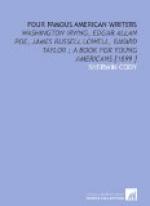In 1842 Lowell and Cobert G. Carter, who was about the same sort of a business man as the poet himself, started a periodical which they called the Pioneer. They had no capital; but they did have literary connections, and they were able to get together for the three numbers they published a larger number of contributions from distinguished contributors than has often fallen to the lot of any American periodical. It is true that these men were not as famous in those days as they have since become; still, their names were known and their reputations were rapidly growing. The best known were Poe, Hawthorne, Longfellow, Whittier and Emerson; but there were not a few others whose names are well known to-day. The magazine had a high literary character, and was well worthy of the future greatness of the contributors. Unfortunately, it takes something more than literary excellence to make a successful magazine. Sometimes the literary quality is too high for the public to appreciate. This was true of the Pioneer. A magazine also requires a large capital and commercial ability in the business office. It is not at all strange that the venture did not succeed. It could not have done so. Three numbers only were issued, and those three left behind them a debt which the young publishers were unable to pay until some time after.
At the same time that Lowell was having trouble with his magazine, he found his eyes becoming affected, and he was obliged to spend the greater part of the winter of 1842-43 in New York to undergo treatment. Here he made many new literary acquaintances, among others that of Charles F. Briggs, who started the Broadway Journal with the assistance of Poe. In the meantime, he kept on writing poetry with more vigor than ever, and in 1843 published a second volume of verse, containing his best work since “A Year’s Life” appeared.
His contributions to the periodicals included much prose as well as poetry. Among other things, he wrote a series of “Conversations on some of the Old Poets,” which was published in a volume the same year that the second book of poems came out. It consisted mainly of essays on Chaucer, Chapman, Ford, and the old dramatists. He never cared to reprint this first excursion into the realm of literary criticism; but it opened up a field which he was to work with distinction in after years.
Lowell’s prose is delicate, airy, and fanciful, but at the same time keenly critical and sharp in its thought. “Fireside Travels” and “From My Study Window” are books which are known all over the world and which are everywhere voted “delightful”.




